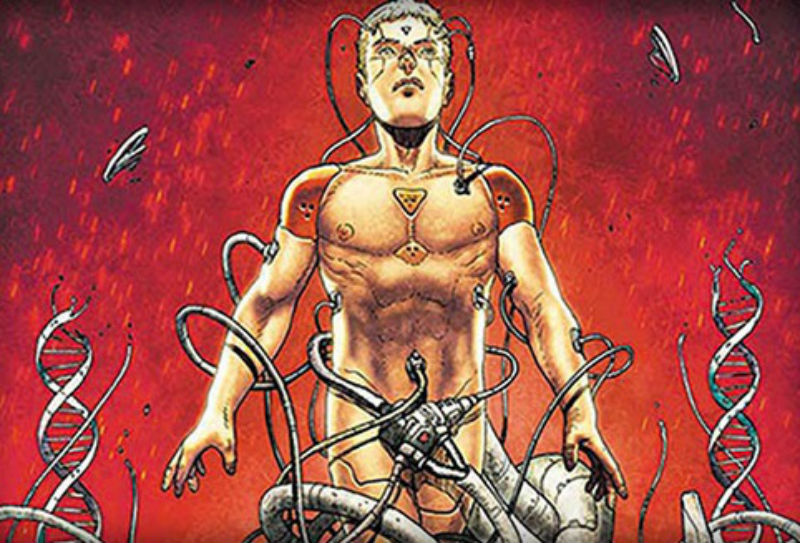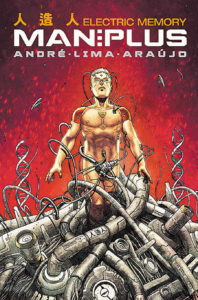
Man Plus: Electric Memory
Writer: Andre Lima Araujo
Colourist: Arsia Rozegar
Letterer: Tom Williams
Publisher: Titan Comics
Review by Billy Seguire
 The future of man, machine, and society has always been pushed inevitably towards a moment of convergence by science-fiction. If you’re optimistic, that moment can be written as the still more glorious dawn that awaits our Star Trek like future. Yet optimism rarely thrives in storytelling outside of Gene Roddenberry. Living in the same pessimistic sphere as Blade Runner in its outlook, Man Plus imagines our future as a transhumanist dystopia complete with asian-infused corporate culture and anthropomorphic androids. It’s a formula that worked for Philip K. Dick and continues to work for Andre Lima Araujo without feeling derivative. With an Us-versus-Them mentality and blurred lines emphasized by characters developed in visual worldbuilding, Man Plus: Electric Memory gives us a crime procedural in a future where the boundary between man and machine ceases to exist.
The future of man, machine, and society has always been pushed inevitably towards a moment of convergence by science-fiction. If you’re optimistic, that moment can be written as the still more glorious dawn that awaits our Star Trek like future. Yet optimism rarely thrives in storytelling outside of Gene Roddenberry. Living in the same pessimistic sphere as Blade Runner in its outlook, Man Plus imagines our future as a transhumanist dystopia complete with asian-infused corporate culture and anthropomorphic androids. It’s a formula that worked for Philip K. Dick and continues to work for Andre Lima Araujo without feeling derivative. With an Us-versus-Them mentality and blurred lines emphasized by characters developed in visual worldbuilding, Man Plus: Electric Memory gives us a crime procedural in a future where the boundary between man and machine ceases to exist.
One of the more interesting facets of Man Plus is the impact of mega-corporations on society at large. The story is set in Portugal, but the texture of the city is unrecognizable in a future built by CEOs instead of presidents. Opening text fixates on how while “states and their institutions still survive … it’s private investment that dictates progress”. The aftermath is a society where corporations have replaced nations in all but name.
The political reading of Man Plus emphasises the dangers of an ultra-capitalist system by pitching its story directly from the perspective of the public sector. It’s a world where the police are so restricted in their budget and resources that sending a chopper out for a missing person is considered reckless asset management. Cops are fighting insurmountable odds just in the daily tasks related to police work, let alone investigating a conspiracy amongst some of the cities largest CEOs and businesses wielding inconceivable power.
In terms of main story, I keep going back to Blade Runner for reference simply because of how much of a standard that movie sets in this genre. Man Plus follows the flight of an off-world robot hiding within the confines of the city. Hunted both by police and a nameless group of mercenaries, the fight or flight response of the android makes for engaging drama. While it’s a story I’ve heard before, Araujo tells it with such style that I latched onto every page. Though I did find the world to be more interesting than the characters. Nothing outside of a few scenes specifically engaged me to want to know more about them when they were clearly devices for the plot. The scared, pitiful form of Ruy Alto is one of the strongest characters in the whole book, and his arc wraps up fittingly for the archetype.
Visually, Man Plus stands out by not emulating the neo-eighties Blade Runner aesthetic but instead letting its world exist in a grounded, lived-in feel of a society not living up to its expectations that defines our daily life. Colourful leather jackets may lend an anime-inspired look to characters, but streets and buildings crumble with the distinctive marks of cheap plaster. Villains with cybernetic implants are downright horrific in their lack of humanity. One character only retains his lips and teeth in a design reminiscent of something out of Clive Barker’s Hellraiser. It’s a perfect visualisation of the extreme taken too far.
Man Plus is an adult story. It’s clear from the language used between characters that the streets of Olissipo City are no place for children. At times, this level of profanity can be distracting, and serves to limit the potential audience of what holds up as an engaging work. It’s an issue I have with multiple works that take this approach, going as far back to my lukewarm reception on first readthrough. While the themes play more directly to a mature mind, Araujo limits the work by playing into “adult” language and imagery that simply comes across as indulgent. The violent spectacle that comes at the front-end of fourth chapter is both gratuitous and over too quick, emphasizing how little individual characters mean to the ultimate narrative.
Of course, there’s no need for individual characters to matter when the story and world take centre stage. Police captains don’t quote Terry Bisson, but the words hold more weight within the story than the character that’s quoting them. Araujo’s work is designed from a detached, old school sci-fi perspective that apes Dick and Asimo in its use of story and plot as a tool to explore big ideas. Whether or not that suits your personal taste, it’s at least an appropriate choice for the subject matter at hand.
The Verdict
Check It Out. Araujo delivers true transhumanist literature. For the themes and story that Man Plus delivers in the contained medium of a graphic novel, you could do far worse. I loved how horrific the look of the cyborgs became when set against Ruy Alto and the lingering sense of capitalistic oppression throughout the comic was absolutely consistent and fitting. It’s Blade Runner done as well as Philip K. Dick may have if he had been more interested in what a world amongst androids would be like than if they dream.



![[RETRO REVIEW] UHF 30TH ANNIVERSARY](https://geekd-out.com/wp-content/uploads/2019/07/25A4401E-DFF9-4213-8268-E227B46E558F-150x150.jpeg)